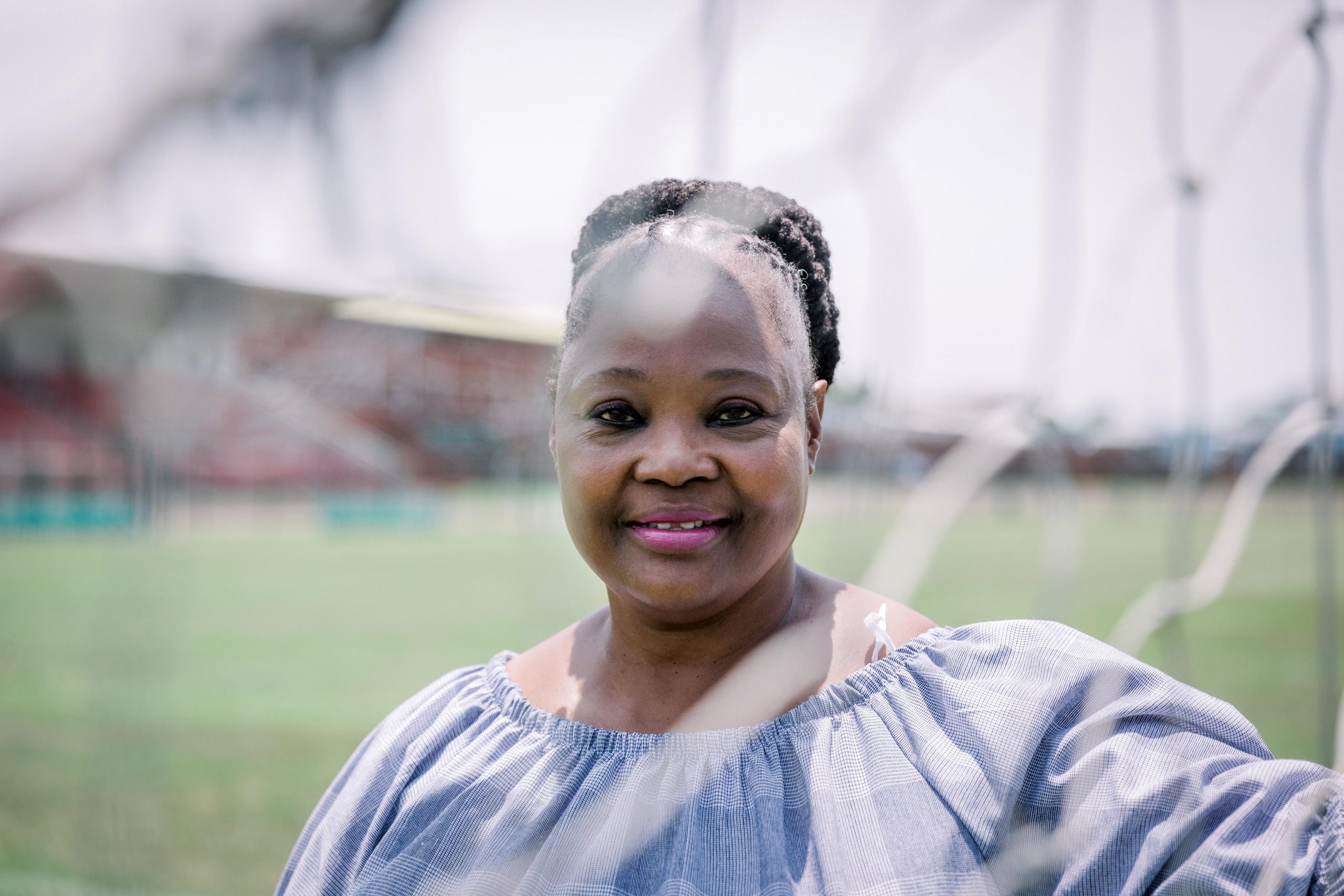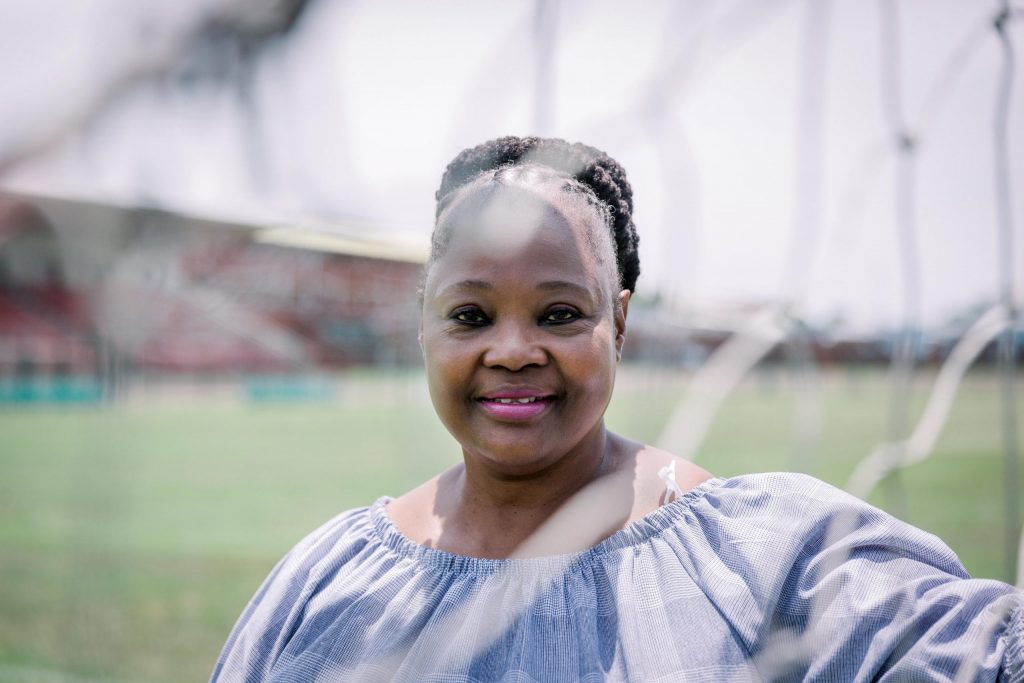
The Durban Ladies owner was instrumental in the formation of Banyana Banyana before setting her sights on building her club into one of the most renowned in women’s football.
Durban Ladies chairperson Mary-Jane Sokhela is the revered pioneer of women’s football in South Africa. Her journey has been arduous, but after 30 years she is still as dedicated as she was when just starting to build the sport.
“I have always been a football fan. I grew up supporting Orlando Pirates. Besides being a football supporter, I was always involved in school’s sport, more involved in athletics doing javelin and shot put,” she said.
“I observed that every time when schools are closed, girls had nothing to do apart from sitting on streets smoking benzine and doing absolutely nothing. Me and my fellow sister Simangele Kubheka then decided to start a football club in 1990 and named it Umlazi Fast Eagles. I played as a goalkeeper, because of my height not because of skill. I realised that people love football, it is just that there was no one to organise them.
The 59-year-old Sibusisiwe High School teacher says it did not take long to see the fruits of her hard work.
“Everything started blossoming by 1993. Southern Natal asked me to be their team manager for the provincial squad. I then won the award for being the best manager, Fran Hilton-Smith was the president of the South African Women’s Football Association. That was before women’s football was integrated into the South African Football Association [Safa]. From there I got elected to be the assistant manager of Banyana Banyana when it was Soweto Ladies.”
Building Banyana and Durban Ladies
Despite the difficulties she has endured, she is happy to see Banyana where they are today, even though she says a lot can be done to improve the team.
“The journey of building Banyana Banyana was not easy because of politics. There were players that were selected to be part of Banyana, but never made it because of football politics.
“Fran Hilton-Smith then decided that we resuscitate Banyana. We sat down with Natasha Tsichlas to come up with a plan to rebuild Banyana. We decided that each province must come up with 10 best players to be trained. Ephraim ‘Shakes’ Mashaba and Ted Dumitru assisted in training. That is how we came up with the best squad in 1997 that was captained by Desiree Ellis. That team started beating countries, which gave birth to the Banyana that we have now,” she reminisced.
Sokhela’s hard work caught the attention of Mike Makaab, then the manager of AmaZulu FC.
“Makaab used to watch us train. One day, he asked if we would like to be the wing of AmaZulu. It was something that I appreciated, to be associated with a big club. We moved to AmaZulu, I had to change the name to AmaZulu Ladies. The team was taken care off with everything. We did extremely well, that was when we produced Veronica Phewa, Makhosazane Zungu and Nelisiwe Cele, who was the best goalkeeper in the Banyana squad.
“Unfortunately, we had to part ways with AmaZulu in 2000 because of a change of management. Makaab, who had a vision for us, was no longer there and the new management had no interest in women’s football.
“I took the team back and changed the name to Durban Ladies. I went back to sponsoring the team myself, so there was no point in giving AmaZulu mileage while they were not assisting us with anything. We were still winning, everybody was writing beautiful articles about AmaZulu, but the reality was that they were doing absolutely nothing for us,” she said.
Almost quitting
With all the financial struggles that women’s football faces, Sokhela has been lucky to find good Samaritans to assist the club.
“In 2003, a guy we didn’t know won a Kombi [minibus] and he decided to donate it to Durban Ladies. My co-director then, Sipho Khathi, helped me to put it on the road. That helped me to run the team until 2014 when it was beyond repair. Then I went back to financing it from my pocket.”
Money has not been Sokhela’s toughest challenge, though. “The biggest struggle I have suffered to date is fighting men in football,” she said. “They don’t want to let women be. No matter how good you are, they will feel intimidated and they will go out of their way to frustrate you so that whatever vision I might have does not get implemented because they feel I will be taking over the limelight. They are just scared of letting a woman be recognised in South African football.
“I have come to almost quitting women’s football so many times because of all the frustrations towards me. When it comes to forming committees, they make sure I don’t come near them. Those frustrations made me want to leave women’s football. I know what I can do when it comes to women’s football. I then realised that Durban Ladies is my personal project, I cannot just pack my things and leave my girls. then I find myself continuing with women’s football.
“I get to think about the whole lot of stars that I have produced in this team, and say I still want to give other girls the opportunity to shine like Amanda Dlamini, Memory Makhanya and many more others that have donned the Banyana jersey,” she said proudly.
Football putting life at risk
One of the scariest moments of Sokhela’s life was when she was threatened after being subpoenaed to give evidence at the Pickard commission of enquiry in 1997, which was looking into financial mismanagement at Safa.
“I started talking about things that were a concern when it comes to women’s football. The sponsorships that were meant for women’s football, but never got really used for the national team,” she said. “We then started getting threats that we were not supposed to come to the commissions, even if we were subpoenaed.
“At some point, I was ready to go for another hearing and I received a call from the judge telling me not to take the flight that was booked for me. He told me that he had booked another flight. I did as instructed. When I got to the commission, I found out that Fran’s car was shot at. Through those commissions, a lot of changes happened in football, even though women’s football did not get the support that we expected.”
Sokhela said that as she is about to retire from teaching, she will be focusing on building up Durban Ladies.
“I would like to see this club as a fully functioning club with development teams by 2022. I want to have Under-15, Under-13, Under-11… down to Under-6. My theme is to plant a football seed in a girl child. I have started sending senior players to coaching courses so that they will be able to run this team. In future, I want Durban Ladies to be managed by former players, from technical to management,” she says.
The longest-serving player at Durban Ladies, Zamandosi Nene, was full of praise for Sokhela.
“I have lived a beautiful life under Durban Ladies. I have played for Banyana and got a chance to represent South Africa in the 2012 London Olympics. Mama is an amazing person when it comes to football and personal life. She is resilient and has passion for football. She is like a mother to all of us. She always encourages us to take education seriously, and be respectful to everyone.”

